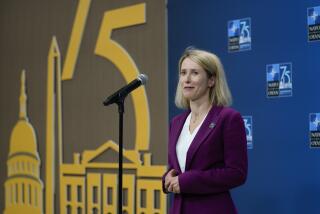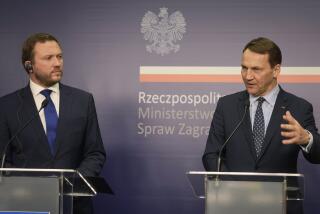Estonians Deny Autonomy Plans Imperil Soviet Unity
- Share via
MOSCOW — Communist Party leaders from the Baltic republic of Estonia on Thursday affirmed their commitment to press for an unprecedented degree of economic autonomy, but they denied their plans constitute a threat to Soviet national unity.
Limited Estonian autonomy over its economic affairs would lift constraints on one of the most successful of the Soviet Union’s 15 republics, decentralize a degree of control long guarded jealously by Moscow and almost certainly set a precedent for other republics to follow.
Several other Soviet republics, including Latvia, Lithuania and Byelorussia, are said to be watching Estonia’s attempt to establish its own production and trade patterns, including those to foreign customers.
Currents of Nationalism
The Baltic states are acknowledged as among the most efficient of the 15 Soviet republics, and demands for greater economic and political autonomy are a major element in emotional Estonian nationalistic currents.
“An economy shouldn’t be subject to the laws of a republic or the union, but must be governed by laws of the economy,” declared the architect of the Estonian plan, Michael Bronstein, at a news conference.
However, he was careful to stress that any loosening of Estonian ties from Soviet central planning should not be construed as a challenge to central authority.
‘All Interdependent’
“We cannot be fully economically independent,” he said. “We’re all interdependent.”
Estonia’s recently installed party leader, Vajno Vaelas, indicated that he was involved in talks with national party leaders here but that the extent of autonomy eventually granted remained under discussion.
Questioned whether the republic would be freed from the production demands of central government ministries and the giant central planning agency, Gosplan, Vaelas replied, “This is what I came here to answer.”
The 57-year-old former Soviet ambassador to Nicaragua took over as the republic’s party leader earlier this month following outbursts of Estonian nationalism.
Estonia is only one of several areas of the Soviet Union where nationalistic feelings have boiled over into the streets in recent months. Controlling these sentiments is viewed as one of major challenges facing Soviet leader Mikhail S. Gorbachev.
Influx of Russians
In Estonia, these emotions also have been fed by fears that a steady immigration of ethnic Russians has endangered the survival of Estonian culture. Roughly 65% of the republic’s population is now Estonian.
Last February, thousands of Estonians took to the streets of the capital, Tallinn, shouting, “Get the Russians out!”
The demonstration occurred on the anniversary of the country’s brief period of independence between 1918 and 1940, before it was absorbed into the Soviet Union along with Latvia and Lithuania.
Speaking for the first time to foreign reporters, Vaelas brushed off suggestions that a growing Estonian nationalist movement, the Popular Front, constituted a political threat to the party’s dominance. Its activities, he noted, are supported by the Communist Party.
“Many here see the Popular Front as a kind of opposition,” he said. “The movement is just recently born, but it’s headed by Communists. It is important that different people with different viewpoints have the opportunity to display their initiatives.”
Greens Tied to Party
He also said that an active Estonian chapter of the Greens ecological movement was not an opposition force, but was instead filled with party activists.
“There’s a single party system in the Soviet Union, and this will continue--but it doesn’t preclude political pluralism,” Vaelas said.
Unlike his predecessor, Vaelas is viewed as an enthusiastic supporter of both Gorbachev’s reforms and a degree of economic autonomy for Estonia.
His remarks Thursday reflected what observers here see as an attempt to at least partially harness the republic’s strong nationalist feelings by co-opting recently formed groups and avoiding a direct challenge that could badly damage the party’s image.
More to Read
Sign up for Essential California
The most important California stories and recommendations in your inbox every morning.
You may occasionally receive promotional content from the Los Angeles Times.













